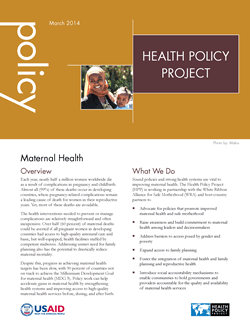The Health Policy Project ended in 2016. Work continued under Health Policy Plus (HP+) until 2022.
Maternal Health

Elizabeth T. Robinson/Health Policy Project
Overview
Each year, nearly half a million women worldwide die as a result of complications in pregnancy and childbirth. Almost all (99%) of these deaths occur in developing countries, where pregnancy-related complications remain a leading cause of death for women in their reproductive years. Yet, most of these deaths are avoidable.
The health interventions needed to prevent or manage complications are relatively straightforward and often inexpensive. Over half (60 percent) of maternal deaths could be averted if all pregnant women in developing countries had access to high-quality antenatal care and basic, but well-equipped, health facilities staffed by competent midwives. Addressing unmet need for family planning also has the potential to drastically reduce maternal mortality.
Despite this, progress in achieving maternal health targets has been slow, with 90 percent of countries not on track to achieve the Millennium Development Goal for maternal health (MDG 5). Policy work can help accelerate gains in maternal health by strengthening health systems and improving access to high-quality maternal health services before, during, and after birth.
What We Do
Sound policies and strong health systems are vital to improving maternal health. The Health Policy Project (HPP) is working in partnership with the White Ribbon Alliance for Safe Motherhood (WRA) and host-country partners to
- Advocate for policies that promote improved maternal health and safe motherhood
- Raise awareness and build commitment to maternal health among leaders and decisionmakers
- Address barriers to access posed by gender and poverty
- Expand access to family planning
- Foster the integration of maternal health and family planning and reproductive health
- Introduce social accountability mechanisms to enable communities to hold governments and providers accountable for the quality and availability of maternal health services
- Promote the provision of respectful maternity care
- Improve the status and working conditions of midwives
Promoting Respectful Maternity Care
While many interventions aim to improve access to skilled birth care, less attention has been focused on the quality of such care. Women often encounter widespread disrespect and abuse in facility-based maternity care. HPP is partnering with WRA to promote respectful maternity care for all women during pregnancy, childbirth, and in the time after birth.
Learn more about HPP's work to promote respectful maternity care
Advocating to Improve Midwives’ Status and Working Conditions
The availability of skilled midwives is vital to improving maternal health, but midwives are often under-valued and struggle to overcome barriers posed by high patient loads and insufficient medical supplies. In partnership with WRA, HPP supports country-led advocacy campaigns to demonstrate the value of and increase support for midwives.
Learn more about HPP's advocacy work with midwives
Integrating Gender in the Scale-Up of Maternal Health and Related Programs
Multiple studies have shown that gender factors, such as women’s status and empowerment (i.e., in education, employment, intimate partner relationships, and reproductive health), are linked with women’s capacity to access and use maternal health services, a critical component of maternal health (Gill et al., 2011). HPP identifies and analyzes whether systematic attention to gender factors during the planning and process of scaling up family planning and maternal, neonatal, and child health programs would in fact achieve better programmatic outcomes (e.g., wider availability of health services and health interventions institutionalized and sustained) and health outcomes (e.g., increased contraceptive prevalence rate and decreased maternal mortality rate) among their clients.
Reducing Maternal Mortality through Improved Family Planning
Use of family planning services not only prevents unintended pregnancy, it can also protect the lives of many women who face increased health risks when giving birth at a young age. HPP programs help integrate family planning and reproductive health services into existing health programs that focus on reducing maternal deaths during childbirth. We identify barriers that prevent women’s access to these services and work with partners to develop guidelines to help service providers effectively deliver crucial family planning services that help protect the lives of women and infants.
Publications and Resources
Estimated Resource Needs and Impact of Mozambique’s Plano Estratégico do Sector Saúde, 2014-2019
The Plano Estratégico do Sector da Saúde (PESS) 2014-2019 (the Health Sector Strategic Plan), is the overall expression of the priorities, implementation approaches, and resource commitments for health of the government of the Republic of Mozambique (GRM). With support from the USAID-funded Health Policy Project, the Ministry of Health (MISAU) applied the OneHealth model to estimate the financial and health system resources need to implement the plan, and the likelihood of meeting key indicators in maternal and child health and HIV/AIDS related to the Millennium Development Goals.
Investments to Accelerate Reductions in Maternal Mortality: Findings from Expenditure Studies in Uganda and Zambia for the Saving Mothers, Giving Life Partnership
Saving Mothers, Giving Life (SMGL) is five-year public-private partnership aiming to drastically reduce maternal mortality in sub-Saharan Africa. As part of the proof of concept, HPP conducted an expenditure analysis to identify what additional expenditures were made to reduce maternal mortality in the eight SMGL pilot districts in Uganda and Zambia.
A Guide for Advocating for Respectful Maternity Care
Developed with support from the USAID-funded Health Policy Project, A Guide for Advocating for Respectful Maternity Care is a comprehensive resource centered on the Respectful Maternity Care charter, a groundbreaking consensus document that demonstrates the legitimate place of maternal health rights within the broader context of human rights.
Advocacy Approaches to Promote Midwives and the Profession of Midwifery
This brief demonstrates how advocacy approaches can lead to a more supportive environment for midwives and ultimately better maternity care and birth outcomes.
Respectful Maternity Care Charter and Advocacy Materials
The Respectful Maternity Care Charter and advocacy materials build a strong positive global standard to affirm the legitimacy of maternal health rights as basic human rights issues grounded in key international declarations. The charter, poster, and brochure are available in English, French, Spanish, and Arabic.
Integrating Gender into the Scale-Up of Family Planning and Maternal, Neonatal, and Child Health Programs
Working paper analyzing whether gender factors in planning and scaling up programs improves the effectiveness of that process.
Stigma and Discrimination: Key Barriers to Achieving Global Goals for Maternal Health and Elimination of New Child HIV Infections
Working paper examines the current evidence on stigma and discrimination and their negative impact on prevention of mother-to-child transmission (PMTCT), as well as the potential benefits of integrating PMTCT into antenatal care and maternal, neonatal, and child health services.
Achieving the MDGs: The Contribution of Family Planning
Updated analyses on the costs of meeting the Millennium Development Goals (MDGs) indicate that countries would save money by investing in family planning programs.
The Policy Dimensions of Scaling Up Health Initiatives
Working paper examining policy issues associated with scaling up family planning and maternal, neonatal, and child health programs.
Promoting Accountability for Safe Motherhood: The White Ribbon Alliance's Social Watch Approach
This brief outlines social watch techniques that civil society groups can use to hold governments accountable to commitments.


